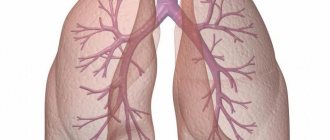Physiology: what happens in the body
The protective cough reflex is activated by mechanical or inflammatory changes in the airways.
This reflex is under the strict control of the brain centers.
Along the afferent nerve pathways, impulses travel from the respiratory organs to the cough center, which is located in the medulla oblongata. In response to a stimulus, it orders certain muscle groups to exhale forcefully and forcefully to clear the airways.
Often, chronic cough in adults is associated with bronchial hyperreactivity, which is why the cough continues in the absence of any serious irritant.
Bronchial hyperreactivity is a state of increased sensitivity to various factors that cause narrowing of the airway lumen (stress, cold and dry air, aerosols).
Bronchial hyperreactivity is observed in bronchial asthma and chronic obstructive pulmonary diseases (COPD)
, but can exist in the absence of these diseases.
Allergic cough
What is an allergic cough? It is not considered a disease. Such coughing is usually accompanied by pain in the throat, runny nose, and a slight increase in body temperature.
Allergic cough is a harbinger or symptom of bronchial asthma. The cause of cough in this case is exposure to allergens.
This type of cough may be associated with an inflammatory process in:
- trachea;
- bronchi;
- throat.
When allergic rhinitis and cough are combined, serious breathing problems can occur. The first thing you need to do in such a situation is to quickly get rid of the causative agent of the body’s inadequate reaction.
Allergic cough is paroxysmal. It begins suddenly and can last a long time. For about 2-3 weeks the patient suffers from constant coughing and runny nose. A person coughs more often at night.
The cough is usually dry, but sometimes it can be productive. The discharge is then transparent, without any impurities.
Etiology: possible causes of chronic cough in adults
In most cases, chronic cough is explained by the presence of an aggravating factor (asthma, medications, pollutants, upper respiratory tract pathology) in a sensitive individual.
The most common cause in adults is smoking, followed by postnasal drip, asthma and gastroesophageal reflux disease (GERD).
.
Common causes of chronic cough in adults:
• Active and passive smoking • Postnasal drip syndrome • Bronchial asthma and eosinophilic bronchitis • Chronic obstructive pulmonary diseases • Gastroesophageal reflux disease • Air pollution, especially PM10 particles • Taking ACE inhibitors (enalapril, ramipril) • Occupational hazards (dust, acids, spices)
Less common reasons:
• Diseases of the lung parenchyma: pulmonary fibrosis, emphysema, sarcoidosis • Cardiovascular pathologies: left ventricular failure, aortic aneurysm • Chronic infections: bronchiectasis, tuberculosis, as well as cystic fibrosis, lung abscess • Post-infectious cough, including after mycoplasma and chlamydial pneumonia • Post-cocosis lush, especially in young, unimmunized people • Tumors: lung cancer, metastatic carcinoma, lymphoma, mediastinal tumors • Upper respiratory tract diseases (other than chronic rhinitis): chronic tonsillitis, obstructive sleep apnea, irritation of the external auditory canal • Foreign body in the respiratory tract, endobronchial scarring changes • Diffuse panbronchiolitis (DPB)
– resistant to steroid treatment • Sensory neuropathy (eg, vitamin B12 deficiency) • Chronic cough associated with tics (eg, Tourette's syndrome) • Heart rhythm disturbances are a rare cause of cough • Idiopathic and psychogenic cough
Home remedies for cough
An acute cough can sometimes be relieved at home using the following methods:
- Use a humidifier to maintain indoor humidity.
- Take hot showers to relieve congestion and open your airways.
- Drink more fluids, such as hot tea with honey, to soothe irritation.
- Rest your body to help it fight the infection.
Over-the-counter medications may also help relieve symptoms:
- cough syrups;
- lozenges for sore throat;
- nasal sprays.
Some cough and cold medicines are not suitable for children. Discuss suitable options with your pharmacist or doctor.
Symptoms, medical history, what to look for
Diagnosis can be labor-intensive and time-consuming.
To at least roughly outline the range of probable causes of cough, you need to pay attention to the following:
• Nature of cough: dry, wet, cough with blood, color of sputum • Cough patterns: duration, frequency, time of day, association with eating and talking • Smoking and occupation that predisposes to chronic cough • Taking medications such as ACE inhibitors • Presence of asthma and other diseases in relatives
Answering these questions will help your doctor diagnose you faster!
Dangerous symptoms of chronic cough in adults:
• Copious sputum production (bronchiectasis) • Systemic symptoms: fever, sweat, weight loss (tuberculosis, cancer) • Severe shortness of breath (heart failure, COPD, fibrosis) • Hemoptysis (tuberculosis, bronchial carcinoma)
The presence of any of the listed symptoms along with a chronic cough may indicate a life-threatening disease and requires immediate consultation with a specialist!
What to do if you have a cough?
They begin to fight cough by identifying its cause. Treatment in this case occurs as a concomitant treatment with the main therapy. Based on the cause and nature of the cough, the doctor prescribes medications.
It is a wrong tactic to “mask” a cough without getting rid of its root cause. In this case, it will gradually become chronic. The cough has the unpleasant tendency to become more complicated.
Modern pharmacology offers a lot of medicines that relieve cough. If it is dry, you will need to use drugs to help the cough transition to wet. You also need to take medications to soothe a sore throat.
For these purposes, it is recommended to take:
- mucolytics (to thin sputum);
- expectorants (intensify cough impulses to quickly release sputum);
- sedatives (reduce the activity of dry cough).
It is very difficult for the average person to make the right choice of medicine. Therefore, you should not self-medicate.
The causes of cough can be eliminated with mixtures and syrups. They are usually made from plant ingredients: anise oil, licorice root, marshmallow. Such plants stimulate the motor function of the respiratory tract.
Potions and syrups are often pleasant-tasting and sweet. But you should drink them only after meals. If you take treatment on an empty stomach, vomiting may occur.
Cough treatment is supplemented with gargling. It is best to do this at the very beginning of the disease, when the sore throat is just beginning. It is recommended to carry out the procedure using saline solutions with Chlorophyllipt.
For each glass of warm boiled water, take a tablespoon of kitchen or sea salt and the same amount of Chlorophyllipt.
Diagnosis of cough
When visiting a doctor about a chronic cough, it is naive to believe that you will get an answer after the first consultation. Often, to determine the cause, you have to undergo a series of tests and diagnostic procedures, as well as visit several specialists.
| Differences between the most common causes of chronic cough | ||
| Bronchial asthma | GERD | Postnasal drip |
|
|
|
During the examination, the doctor will ask you questions about the nature and duration of the cough, provoking factors, allergies, the presence of certain diseases, etc.
Your doctor will look for signs such as paleness, fever, weight loss, swollen lymph nodes, shortness of breath, and a hoarse or nasal voice. You may undergo spirography and chest x-ray, blood and sputum tests.
In some cases, additional research is required:
• Complete blood count • Microbiological examination of sputum • Bronchial provocation test with methacholine or histamine • Bronchoscopy if a foreign body is suspected • Echocardiography if cardiac disease is suspected • 24-hour intraesophageal pH-metry and/or esophageal manometry • CT or MRI of the chest, x-ray sinuses
This is interesting: large-scale epidemiological studies indicate a very low probability of serious illness in adult patients with an isolated dry cough with normal examination results, a clean X-ray and no changes in the spirogram.
What is a cough like with coronavirus?
Many people mistakenly believe that when infected with coronavirus infection, only a dry cough appears. In fact, a wet cough can also occur, and it can be with or without fever.
If the virus begins to spread, the person will feel severe shortness of breath and weakness, and pneumonia will develop (often bilateral). When the disease progresses in a severe form, a person loses the ability to breathe on his own.
We will tell you in detail about each type of cough with COVID-19.
Dry cough due to coronavirus
Usually the cough practically does not stop. This symptom is considered the main sign of COVID-19; it appears 3-5 days after infection. A sore throat is felt almost immediately after a pathogenic molecule enters the body.
This cough is aimed at ridding the body of accumulated phlegm. At the same time, a person cannot clear his throat completely; due to the appearance of swelling in the throat, the voice becomes hoarse and hoarse. The airways narrow, leading to difficulty breathing and shortness of breath.
The peculiarity of dry cough with coronavirus is its paroxysmal nature. The attacks subside for a short time, and then begin, but become even stronger. The reflex does not go away even during sleep. All this is explained by inflammation of the laryngeal mucosa.
An increasing nonproductive cough indicates the rapid spread of coronavirus in the body.
Wet cough due to coronavirus
A wet cough when infected with COVID-19 can appear in two cases:
- the person is recovering or the illness is mild;
- pneumonia begins to develop.
When coughing, phlegm is usually produced in the form of mucus. Its release is necessary to cleanse the respiratory tract of viruses and infections. But when sputum accumulates on the walls of the bronchi and trachea, it irritates them, thereby causing a cough. As soon as the mucous secretion leaves, the person’s well-being improves, but not for long.
If a wet cough is a sign of pneumonia, it begins on the 3-4th day of illness. With viral pneumonia, the mucus is clear, without purulent or blood impurities. If pneumonia is caused by bacteria, a small amount of green pus will be present in the mucus. Before you begin treatment for pneumonia, you need to determine its type.
A wet cough with coronavirus appears only after a dry one.
When a wet cough occurs, it is important for the patient to drink a lot of clean water.
On this topic:
Smoker's cough or bronchitis, how to get rid of it and symptoms
Bloody
Blood in the sputum may appear a week after infection. The appearance of blood in mucus is explained by the rupture of small blood vessels. If blood is present in small quantities, it is not so scary, but only if you consult a doctor in time. If the mucus turns brown, we are talking about the development of pneumococcal infection.
With temperature
A dry cough and elevated body temperature are characteristic signs of COVID-19. Temperature indicators depend on the person’s immunity and the degree of development of the disease. Often, at elevated temperatures, the most dangerous symptoms of coronavirus develop:
- severe dry cough;
- attacks of suffocation;
- headache and muscle pain;
- weakness;
- loss of appetite;
- lack of taste and smell;
- severe pain in the chest area, which makes it impossible to take a deep breath and exhale.
If the temperature rises above 38 degrees, this indicates that the body is unable to fight the virus on its own and needs help in the form of medications.
Cough without fever due to coronavirus
If the disease is just beginning to develop, a dry cough appears at a normal temperature, so this does not mean that there is no reason to worry. If the body is strong enough to fight the coronavirus, the body temperature will increase slightly - no higher than 37.5 degrees. The symptoms of coronavirus without fever are the same as with it.
IMPORTANT! The main symptom of COVID-19 is a dry cough. A third of Wuhan residents who were diagnosed with Covid 19 had no fever .
Treatment of chronic cough in adults
After diagnostic measures have been carried out, treatment will be prescribed aimed at eliminating the cause of chronic cough.
Unfortunately, the cause of a cough cannot always be identified the first time, so be patient and follow your doctor’s advice exactly.
British guidelines sometimes recommend a trial of treatment strategy, by which the doctor tries to confirm the diagnosis. A particular drug is prescribed for a certain, fairly long period of time, and the reaction of the patient’s body prompts the correct answer.
Trial therapy for chronic cough in adults (Chronic cough in adults. BMJ, 2009):
• Reason for taking ACE inhibitors: stop treatment/change drug. With ACEI-induced cough, improvement occurs within 4 weeks. • Suspected asthma: Give inhaled corticosteroids for 8 weeks or oral corticosteroids for 2 weeks (methylprednisolone). • Suspicion of GERD: prescription of high doses of proton pump inhibitors (PPIs)
should lead to improvement. Treatment is prescribed for up to 12 weeks. • Postnasal drip syndrome: trial treatment with antihistamines or nasal corticosteroids (beclomethasone, mometasone).
Important:
in all cases of chronic cough, you should stop smoking and minimize exposure to airborne irritants. If your work involves such exposure, it is recommended that you take time off for the entire period of examination and treatment.
Causes
Below are some potential causes of cough without fever.
Common cold
Adults typically get colds two to three times a year, and most are caused by a group of viruses called rhinoviruses.
A common cold may cause a mild to moderate cough, usually without a fever. Other possible cold symptoms include:
- sneezing;
- nasal congestion;
- a sore throat.
Treatment
The common cold usually clears up within a week or two without the need for medical treatment. However, you can take over-the-counter medications to relieve symptoms.
Symptoms
Since, in most cases, a chronic cough is a manifestation of one or another disease, its clinical picture will be supplemented by:
- runny nose;
- nasal congestion;
- noise, wheezing and whistling when inhaling or exhaling;
- shortness of breath;
- belching with a sour or other unpleasant odor;
- the appearance of a bitter taste in the mouth;
- sputum - sometimes mixed with blood;
- attacks of nausea, occasionally ending in vomiting.
In case of particularly severe illnesses, chronic cough can be complicated by:
- severe dizziness and headaches;
- increased sweat production;
- severe weakness of the body;
- spontaneous emptying;
- sleep disorders.
Traditional treatment
Remedies from a natural first aid kit are aimed at relieving the main symptom. How to cure chronic cough with folk remedies has been known since ancient times; there are many recipes.
A medicinal mixture of goat fat and bee honey. To prepare it, ingredients are taken in equal proportions and heated in a water bath; in a melted state, they are mixed until a homogeneous consistency. The product is lubricated on the chest, then you need to wrap yourself in a scarf. It is best to use it at night.
Garlic and onion are well-known antiseptics that are also effective in relieving coughs. Finely chop one head of garlic and 1 kg of onion and cook in milk for about 40–50 minutes. When the broth has cooled, add natural honey to it. Drink the product 1 tbsp. l. each hour. The medicine removes mucus and softens cough.
The use of onion inhalations is also effective; it must be cut, placed on a dish and inhaled in pairs for 15 minutes 2-3 times a day.












